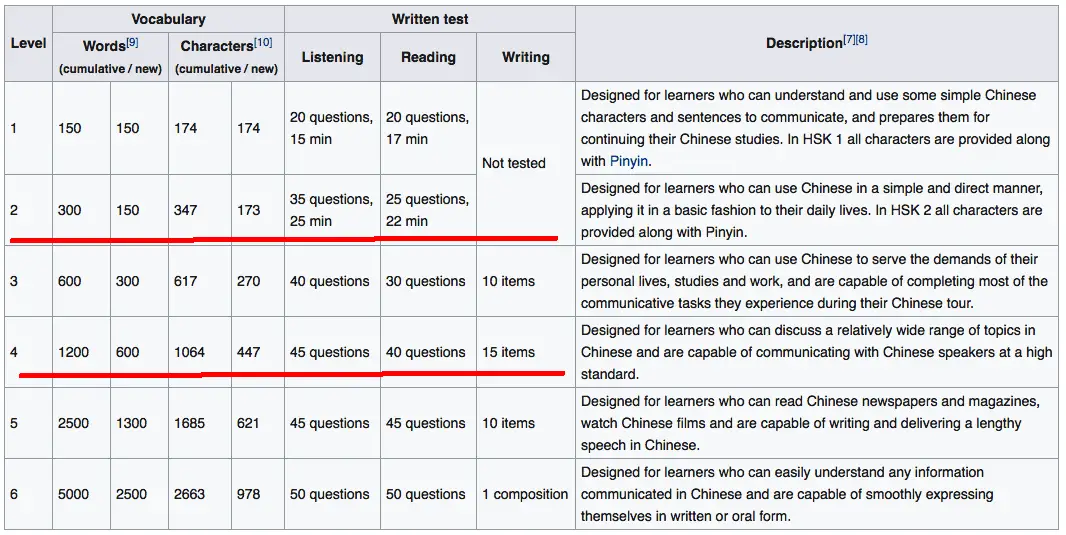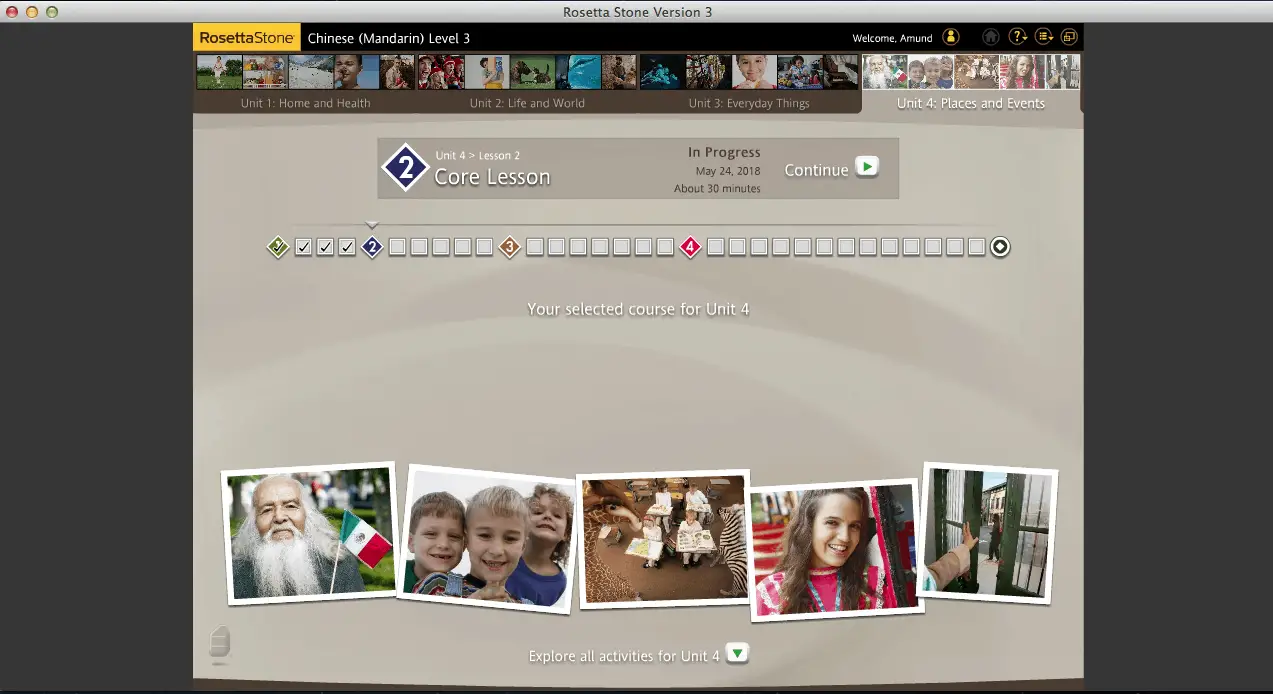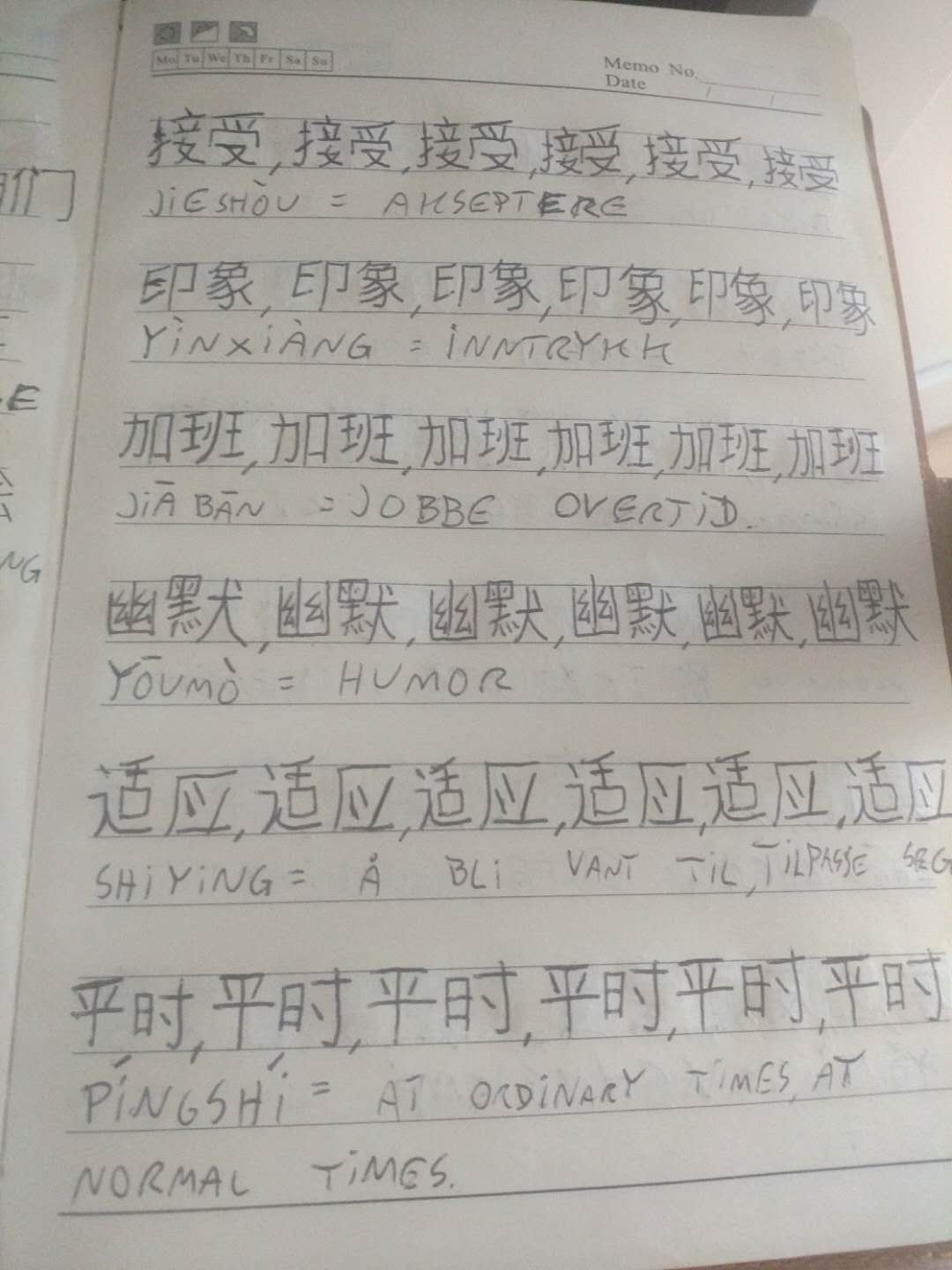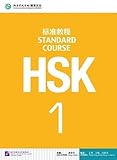There are loads of reason why you should learn Mandarin Chinese. First of all, China is the most populated country in the world. With roughly 1.3 billion people they even “beat” India (1.2 billion) and United States (300 million). Mandarin is the most common dialect in China. According to this BBC article, about 70 % of the Chinese citizens speak standard Mandarin Chinese. The rest speak local dialects, but the trend is clear: more and more of the Chinese population are learning Mandarin. And among the young generation, nearly 100 % know the language which in Chinese is called “pu tong hua”( 普通话 ) .

Table of Contents
- Motivation to study Mandarin
- My way to HSK2…and HSK4
- How did I learn Mandarin? [Working methods]
- Necessary tools needed to learn Chinese
- What is the easiest way to learn Mandarin?
- Conclusion
Motivation to study Mandarin
For me, not learning Mandarin was never a choice. And the reason for that was simple: I moved to China. As I moved to Beijing, I quickly understood that I needed a certain level of local language skills to survive in the Chinese capital. The general English level in China is improving every single day, but is still quite low. About 95 % of all Chinese people will never leave their country anyway: so why would they care to learn another language?
Most street signs in the tourist areas are written in both Chinese and English. But if you just go a bit outside the city center, you are in trouble unless you know some basic Mandarin. So that was the motivation for me. But most people that will read this article have probably never been to China.
My way to HSK2…and HSK4
If you ever hear some foreign students in China discuss their Chinese language level, you will hear this question pop up:
“Which level are you at?”
And by “level”, they would refer to a test kalled Hanyu Shuiping Kaoshi ( 汉语水平考试 ). Or in English: Chinese Mandarin Level Test.
This is what I got from Wikipedia when I searched for “HSK”:

As you can see, there is quite a big difference between being at HSK2 and HSK4. When I started as a student in Beijing, I was really motivated to learn Chinese. We were an international group of 15 students where only two of us actually went “all-in” in order to learn the language. After one year of studying (mainly after school and during weekends), I was able to qualify for HSK2. And I did it. Easy.
How to get from HSK2 to HSK4
Now, it took me a lot of effort from going to HSK2 to HSK4. The reason? I had not learned a single character while preparing for level 2. The reason for that is simple: you do not have to.
What I did was just learning how to say the words. I wrote them down in what is called pinyin , which is the “Western” way of writing Chinese words. Let me explain that with an example.
“I love you” in Chinese is written “我爱你”.
If we break that down character by character, it would look like this:
我 = I (wo)
爱 = love (ai)
你 = you (ni)
So in a HSK2 test it would look like this:
Please translate
我爱你
Wo ai ni
In an HSK4 test it would look like this:
Please translate
我爱你
You see the difference? There is no point learning the characters if you “only” will try to get the HSK2 certificate.
Pro tip: start learning characters from day 1
My best advice would be to start learning the characters straight away. If you are getting serious with learning Mandarin Chinese, you really should focus on getting the characters right from day 1. As you might understand, I had to both learn all the new characters and words from HSK3 and HSK4 vocabulary in addition to all the characters from HSK1 and HSK2….arhhh. It felt like I was working twice as hard as all the other people that were going to take the HSK4 exam. The truth is just that I was “lazy” when I tried to get to HSK2.
How did I learn Mandarin? [Working methods]

I am going to be completely honest to you: there is nothing that works but hard work. You can buy some great tools online and try to make the whole journey smoother. But if you, as a foreign person, will try to learn Mandarin Chinese you will have to understand that it takes a lot of effort. A lot.
Anyway, I have gone through a lot of different methods and found out that only three of them really worked for me. Believe me: I have been at the point where I went through hundreds of different tools/subscription programs and was constantly “sold the dream”. I remember back to those programs that promised that you could become fluent in Mandarin Chinese after purchasing their subscription service for 3 months or so….scam, scam, scam!
So. What does work when you try to learn Mandarin Chinese?
Rosetta Stone
Probably the best investment I did from a software point of view. And the only tool, despite trying at least 5 of them, that I sincerely can say worked very well for me.
This is how it looks like on my computer. I just took some screenshots:

This is how it looks like when you open the program. I am at the last unit of the last level. As I already had surpassed that level, I did not bother finishing. But as you can see, it includes a lot of different topics such as “Home and health” & “Everyday things”. These are quite broad topics, but it means that you will learn a wide range of words that are quite useful.
I am always surprised how good they are at teaching words that you will actually use when you are in China.

There are three different tasks in Rosetta Stone. This screenshot shows one of them.
Listening: The task shown above. You listen to a sentence or a word and will have to choose the right picture. Often, as you also can see in the screenshot, you will be given the pinyin text.
Writing: You hear a sentence and will have to write it down. But relax, it is still only in pinyin. No need for characters yet.
Reading: You read a sentence and will have to choose the right picture.
The price of Rosetta Stone is quite steep. So when I say an investment, I really mean an investment. But if you want to learn Mandarin Chinese in a fun and efficient way, there is no better tool out there (in my opinion). I see that you can find Rosetta Stone on Amazon as well now, click here to see the prices and read reviews from other people. As mentioned previously: it is a very good tool if you are serious about learning Chinese.
The closest thing to Rosetta Stone in terms of quality is audio books called “Pimsleurs Mandarin Chinese“. However, I stopped listening to them as the person talking got a too heavy Beijing accent (you will understand when you are at a certain level.
Writing down the characters and making flash cards
You should get a notebook and some white paper. Use the notebook to write each and every character at least 5 times like this:

Then you cut each paper in 6 smaller pieces and create a flashcard. On the front side, you will have the Chinese character. On the back, you will have the explanation in your native language.
I have found this to be one of the best ways to remember Chinese characters. And of course, you have to use the flash cards. Only creating them will not make a difference.
Language partner
At some point, you would need one. I know that it isn`t too easy for most people to just go out there and find a native Chinese speaker. It all comes down to how many Chinese people that can be found in your area – and if they are willing to learn another language or not.
I went on an app I cant remember the name of right now and found a woman in Oslo that wanted to learn Norwegian. In exchange, she would be willing to hold some Chinese classes for me. In other words, the perfect language partner relationship. And that actually worked pretty well.
Now, there are loads of apps and websites that connect people with various language skills together. And if you are willing to find a partner that you only talk to online, I can guarantee that you will find a lot of Chinese people willing to teach you Mandarin Chinese. And the best of all? Most of these apps and websites are free.
Necessary tools needed to learn Chinese
I would recommend two things to you. All of them can be bought on mazon.
#1: HSK books
First, you definitely need the HSK books. These are text books that will help you to get started. HSK is the official Chinese language test system for foreigners.
Now that I have taken HSK4, it’s easier for me to get approved a work visa in China.
In other words: these are the official books for foreigners that want to learn Chinese language. And they work. Every time I reached a new level, these were the first books that I bought:
Obviously, if you haven’t had any experience with the Chinese language, I would recommend to start with HSK1. It’s not like you can skip the basic stuff. 🙂
#2: Rosetta Stone
The most interactive and fun way to learn Chinese is actually through your computer. That’s also the most 方便 (convenient) way to do it. Especially if you don’t have any close Chinese friends that can help you out every day.
- Why stick to just one language, With Rosetta Stone: Unlimited Languages, you'll receive access to all 24+ of our languages for life, that means you can switch between languages without any additional subscription fees
- Thrive in another language: with Dynamic Immersion, you'll learn through context by seeing, hearing, speaking, reading, and writing just like you do in the real world
- Sound like a native: get instant feedback to perfect your pronunciation with our patented TruAccent(R) speech recognition engine
- You're always on your phone so your language learning should be, too: your Rosetta Stone subscription gives you access across all of your devices, mobile, tablet, and desktop
I will talk more about how Rosetta Stone helped me to sky-rocket my Chinese level later in the article.
But just trust me. If you want to learn mandarin Chinese fast, you really need Rosetta Stone. After just playing around with it for a couple of days, you can actually have a very simple conversation with a Chinese person. To my knowledge, no other tools can help you do that.
What is the easiest way to learn Mandarin?
Moving to China. Simple as that. You remember that I said that I believe almost no one of my readers have been to China? I also believe that even less will ever consider moving there. But it is, by far, the most efficient way to learn Mandarin.
Think about it.
If you are surrounded by a language all the time, you have to learn it some day. Newspapers (only) in Mandarin sold in the local store. All traffic signs written in the same language. People around you speak Chinese in every single conversation – and you start to pick up a phrase or two as you walk around the city. If you are sitting in a bedroom in Ohio, learning Chinese is not so easy. You really have to have 100 % motivation and set a clear plan for how you are going to do it.
Need topics for deep conversations? Here’s our list.
Some solid tips on getting motivation
You can buy the most expensive tools, hire a native Chinese teacher and spend 100s of dollars on Chinese books. But you will never learn a single word or character unless you are motivated to do so. I can’t explain how important it is that you really want to be good in Chinese before you start. If not, it is going to be waste of time.
I can almost guarantee you that this will happen:
Week 1-4: You are super motivated. Buying all types of tools, trying to watch some Chinese cartoon shows on Youtube (where you, of course, don´t understand anything) and Googling “how to become better in Mandarin Chinese” almost every single day.
Week 5-8: It starts to slow down. You see that this is actually a pretty big mountain to climb. Starting to get unmotivated. Thinking: “Why should I really learn Chinese? I don´t live in China.”
Week 9-12: The frequency of your classes is shrinking. You start to regret buying the tools and face that you will never really learn Mandarin Chinese. Because “why would I?”, right?
Week 13: There is no week 13.
So how can you avoid going down this journey?
Making sure that you are 100 % motivated before you even learn to say ni hao.
Conclusion
Following these steps will most likely create success if you plan to learn Chinese. I know the feeling of excitement when you start to learn a few couple of words in a so different language. You can go to the local Chinese restaurant, point at the menu and say “zhe ge” (it means “that one”) and people will understand you. That is a great feeling. But there is a big chance that you will stop quickly after that as you don´t really are able to see quick progress. Chinese is a very difficult language. In fact, it is considered the most difficult language in the world to learn for English speakers according to this article.
There is no escaping from this formula if you really want to learn Mandarin Chinese:
1) Understand yourself. How motivated are you really to learn this language? Will you spend time every single week for the next two years in order to see progress?
2) Get some good tools. Do not waste money on scam companies that promise you “great progress in few weeks“. It will never happen anyway. Buy Pimsleurs or Rosetta Stone.
3) Get a language partner and a notebook. Start writing down characters from day 1. It is fun to see progress.
And lastly, I just want to mention that learning Mandarin Chinese is really fun. I know I might sound a bit strict in this article, but I really do not want you to spend an awful lot of time on something that you will quit in a couple of months. Try to keep it going and you will see great results within a year! 🙂 谢谢你的配合!再见!






I can tell you’re the real deal. Learning mandarin chinese isn’t easy, Ive just passed HSK2 myself.
How long did it take you to go from HSK2 to HSK4?
And can you give me some tips on how to speed up the process ? 😀 im super eager to become one of those that can have a proper conversation when I visit China town (I live in Milano=
Hello Paola!
It took me about a year to go from HSK2 to HSK4. That being said, I did not study actively. If I had studied a lot of characters in that period, I would probably have done it in less than six months.
Tips:
1) Move to China/Taiwan/Hong Kong. That’s so extremely helpful.
2) If you can’t do that, try to interact with some Chinese speaking people in your area. There might be a lot of people intersted to talk to you in China town?
3) Talk to people.
4) Learn the word before you learn the character. it’s SO much easier. If you see a character for the first time, but not knowing what it means…it’s almost guaranteed that you will forget it.
It’s so impressive that you’ve managed to learn Mandarin Chinese. I took the HSK1 test about a year ago, just to have some paper showing that I at least know SOME chinese 😛
now after covid my company wants to send me to shanghai to work and I will start to pick up again. probably trying the rosetta stone package even though it’s expensive
Thakns, Juglern!
And stay in there! the feeling of actually walking around in Shanghai talking Chinese is so amazing. You will NOT regret if you keep on learning Mandarin Chinese 🙂
I also added some learning material to the article that you can choose from.